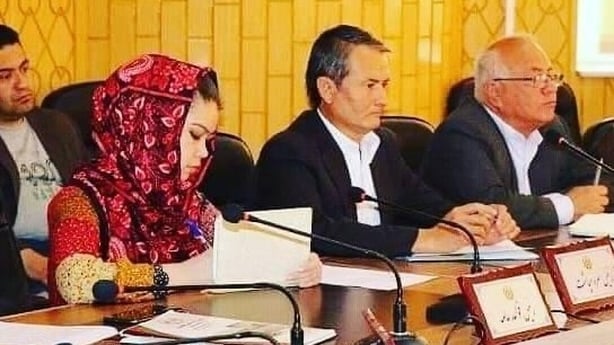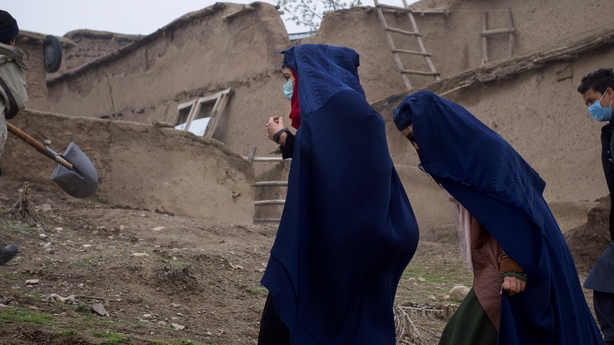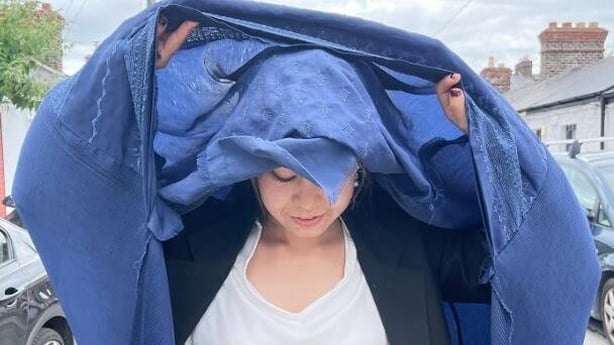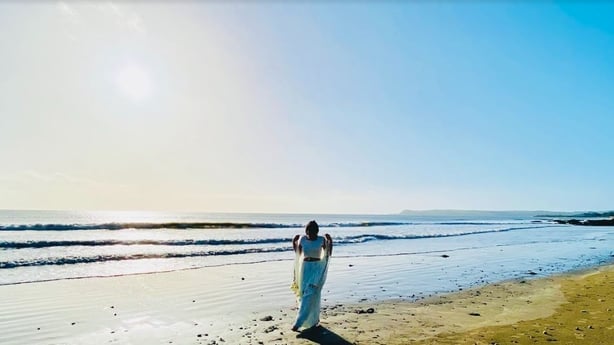As the United Nations warns of a human 'catastrophe' unfolding in Afghanistan and women see the collapse of their rights, one Afghan woman in Ireland reflects on what led her to leave her country after the Taliban took power across the country. Basira Pigham writes about her complicated journey to Ireland and everything she left behind.
On Thursday, 12 August 2021, I had a strange but wonderful experience.
I was named as one of Afghanistan's Freedom Champions by a leading human rights non-governmental organisation (NGO).

The White Assembly is an independent charity which empowers young Afghan women and men to embrace democratic ideals. Its Freedom Champions Award recognises work in promoting human rights, and as one of the winners, I was to address the National Youth Assembly in the capital, Kabul.
At that time, the skies of my country and the hearts of my people were shrouded in darkness, fear and hopelessness. I did not know it at the time, but it was to be the last gathering of activists in Kabul that I would attend.
The day's events are still fresh in my mind. Everyone was worried, discussing the future of Afghanistan and what it would mean for the younger generation.
Fear and anxiety danced in our eyes, and when the program finished, I and some of my friends went for a walk around town. We were dressed casually, as we usually did.
A male pedestrian said to his friend, "Ooh! Look what they are wearing. Imarat will take you off the streets, and throw you in jail". Bakhair Kota Qolfi mishin.
Kabul had changed. All of its colour and vibrancy had drained away. Now, everything felt black and white.
The future was shrouded in shadows. Everyone was talking about the last day of the withdrawal of US military forces, Tuesday 31 August. I had very little money, and my friends advised me to withdraw some cash. I went to an ATM, but it wasn't working, so I went to the bank. After queuing for four hours, I was able to get $100. This was Friday, 13 August, the day after the awards ceremony.

On my way home that evening, I was alone and wasn't wearing a Burka. Men just stared at me, devouring me with their eyes. That night, I couldn't sleep. I was worried, because I was an activist with a public profile, and had appeared on the media.
But I didn't have a male family member to accompany me (called a "mahram"). The Taliban shoot any women or girls who go out without a mahram. As the prospect of their taking over the country loomed ever larger, I felt lost and overwhelmed, and didn't know what to do.
Lying on my bed, I could hear helicopters and aircraft flying overhead. I remembered my mother telling me and my siblings about the withdrawal of Soviet forces, in 1989.
"When the USSR left Afghanistan, the noise of their aircraft filled the sky for nights", she had said. I cried silently. With my eyes full of tears, and my thoughts teeming with dark fears, still there was a hope in my heart which refused to accept that the international community, the US and the United Nations, would turn their back on us.
I could not believe that they would give up on two decades of hard-won achievements, including nurturing democratic processes and improving human rights, especially for women.
But that morning, I awoke to the news on Facebook that our President Ashraf Ghani had fled the country.
With the stroke of a pen, the US had handed over the fate of Afghanistan to the fundamentalist Taliban. In the blink of an eye, everything that had been built over two hard decades had been vanquished.
Everything I wanted to achieve, all my plans and dreams, were in Afghanistan. Even in the face of Taliban rule, even if that meant that I had to struggle to survive, still I did not want to leave my homeland.
I asked one of my friends to let me stay with her. She agreed and I went to her home. But when her family discovered that I was an activist, and had been on media, they started to fear for their own safety. They asked me to leave.
The following month, September, activist women started taking to the streets of Kabul to protest at the repression of our rights by the all-male Taiban.
Then one day, as we marched, the Taliban soldiers opened fire on us. It was terrifying. Women and girls were screaming. The soldiers, who looked about 16 or 17, smiled as they shot at us.
It is hard to describe seeing young men - in government uniforms - taking pleasure in inflicting suffering and fear. They were like robots, with no concern for the terrified women and girls who were screaming in front of them.
It was devastating to witness such deep hatred in the eyes of such young men. It will be a very long time before they are ready to allow us Afghan women to live our lives with respect and dignity.
For three months I tried my best to stay safe, but in the end living in Afghanistan was just too dangerous, and I was left with no alternative. To ensure my survival, I had to flee my homeland.
Everything I had, everything I had worked for, everyone I knew, and all we had built together; if I was to live, I must leave all of it behind.
Deciding to leave the land of my birth was like splitting my soul from my body, and then carrying a dead soul in a living body just to survive. Even a bird is reluctant to leave the nest. For humans, leaving home, memories and loved ones is so much tougher.
In October, I got a visa which allowed me to enter Pakistan and then Ireland, thanks to the support of Concern Worldwide, where I was working as a gender specialist. As an independent and single woman, traveling alone was almost impossible under the Taliban regime. But I managed it by preparing a marriage document with a male friend.
While I was packing my luggage, I couldn't decide on what to take. One minute I wanted to bring everything, the next, I figured it would be best to travel light. Finally, I gathered up some books, a package of almonds from my mother's garden which carried the scent of her hands, and some traditional Afghan clothes. Then I left.
The drive to Kabul Airport was like a dream. It felt surreal, like floating in limbo. I couldn't concentrate. My friend had given me a Burka to wear, and when we reached the airport, it was chaotic. As we approached the terminal, a soldier hit me with a lash, and screamed at me, demanding to know why I was wearing high heels.

My male friend stepped in to protect me, and promised that I wouldn't wear them in future. The solider was furious, and clearly wanted to continue to beat me. After begging him for almost an hour, he let us enter the airport. But now we were in danger of missing the flight.
I rushed to the check-in counter, but it was closed, so I found a member of staff and explained why we were so late. They reopened the counter, gave us our boarding passes, and we were on our way.
On Monday, 25 October, I arrived in Ireland. But my heart and soul were still in Afghanistan. For almost a year I struggled with depression. Every night my dreams were filled with images of my homeland, where I was trapped and desperately fleeing Taliban guns and lashes. Each morning when I awoke, I was drenched in sweat, my cheeks wet with tears.
But slowly the healing began. I am getting better. Each day I tend my wounded soul.
Walking along the beach, drinking in the natural beauty of this island nation, helps me to heal and recover. It replenishes my energy and enthusiasm for advocacy. Once again I want to raise my voice together with, and on behalf of, my sisters in Afghanistan.

Afghans taking extraordinary measures to survive

